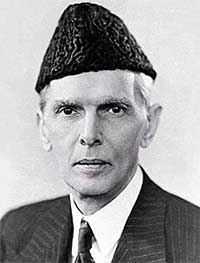CONTEXT:
Recent controversial comments by Suheldev Bhartiya Samaj Party chief Om Prakash Rajbhar and Samajwadi Party leader Akhilesh Yadav including Muhammad Ali Jinnah has risen the name once again in the Indian politics.
About Jinnah
- Jinnah was the person who successfully structured the dream for an independent Pakistan and became its first leader.
- He is popularly called there as 'Quaid-I Azam' or 'Great Leader'.
- National holiday is celebrated on his birth anniversary every year.
- Born on 25 December 1876 in Karachi, now in Pakistan, (then part of British-controlled India) , Jinnah was a barrister by occupation at Lincoln's Inn in London, England.
- Upon his return to British India, he enrolled at the Bombay High Court.
- The nature of politics at that time in India eventually raised interest in him and eventually replaced his legal practice.
Role in Indian politics
- In 1916, he was elected as the president of the Muslim league.
- In 1920, when the Indian National Congress launched a movement of non-cooperation, Jinnah opposed this policy and resigned from the congress.
- After provincial elections in 1937, when the INC refused to form coalition with the Muslim League, it damaged the harmony between Hindus and Muslims.
- In 1940, in the Lahore Muslim League session, the first official demand for the partition of India and the creation of a Muslim state of 'Pakistan' was called upon
- Jinnah always had faith upon the possibility of Hindu-Muslim unity, but the then scenario of differences amongst the two communities and other similar reasons led him to insist that partition was necessary to safeguard the rights of Indian Muslims.
- His continuous efforts and negotiations with the British government resulted in the partition of India and the formation of the state of Pakistan on 14 August 1947.
- Though major muslim faction got their dream come true, but their wish came with horrifying reality of brutal violence between Muslims, Hindus and Sikhs, leading hundreds of thousands to death.
- Jinnah rose to prominence in the Indian National Congress in the first two decades of the 20th century. In these early years of his political career, Jinnah advocated Hindu–Muslim unity, in which Jinnah had also become prominent. In 1920, however, Jinnah resigned from the Congress when it agreed to follow a campaign of satyagraha, which he regarded as political anarchy.
- Jinnah became the first governor general of Pakistan, but died of tuberculosis on 11 September 1948.
Major Contributions by him:
- Muhammad Ali Jinnah is known to be the first political leader to raise a voice against the Salt Tax.
- He called it “iniquitous, unheard of in any other country” according to B.R. Nanda's book 'Road to Pakistan: The Life and Times of Muhammad Ali Jinnah'
- He tabled the resolution calling upon tenders for the Government of India to be opened in India in rupees, rather than in pounds at that time.
- He raised questions regarding the representative status of the Simla Deputation in 1906.
- He helped in shaping the 1916 Lucknow Pact between the Congress and the All-India Muslim League.
- Jinnah, also, was a key leader in the All-India Home Rule League.
- There, he even proposed a fourteen-point constitutional reform plan for protecting the political rights of Muslims in the Indian subcontinent.
Sources
- The Indian Express
- The Hindu
- BBC
- Britannica









